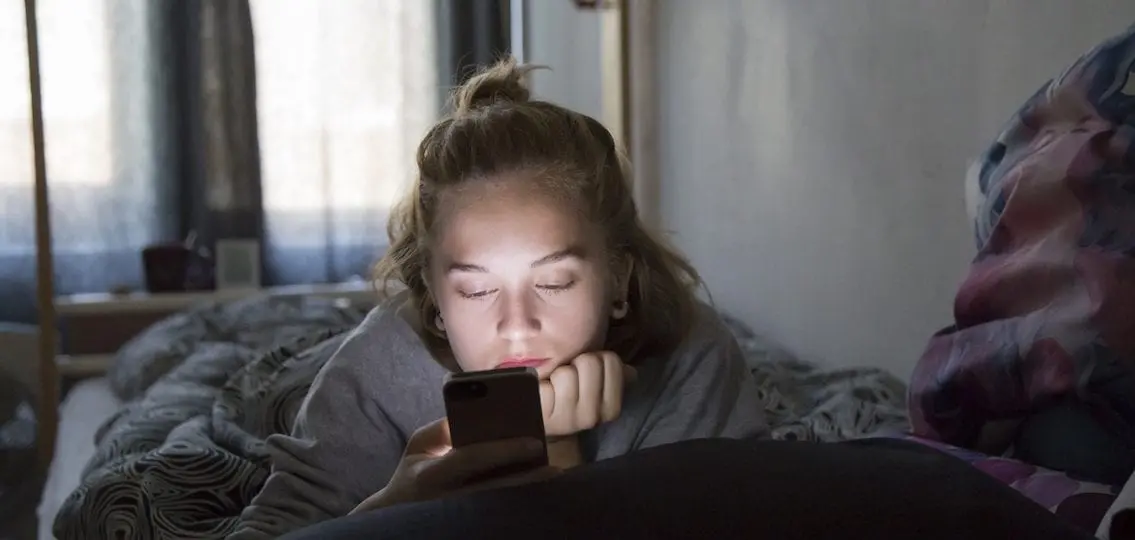When I was in high school in the 1980s, my siblings and I didn’t have phone extensions in our bedrooms. We shared a beige touch-button phone with a curly cord that sat on a shelf in our hallway.
If someone called me, my parents often answered first. Sometimes I couldn’t run fast enough to grab it before one of my parents or older siblings picked up an extension in another part of the house. I’d hear the inevitable, “And who should I tell her is calling?” which meant that my family knew who I was talking to—and for how long. My mom often told me when it was time to end the conversation or if it was too late for someone to be calling in the first place. While I sprawled on the floor of the hallway with my legs propped up on the closet door, my conversation was audible to anyone nearby.
At a party recently, a friend asked me what she should do when her children reach smartphone and social media age. I don’t know whether she believes I can offer expertise from my 25 years as a middle and high school educator or if she assumes that I’ve figured out a few things as the parent of three tweens and teens.
I usually reply to parenting and education questions with the preface, “it’s complicated…”, and follow with a series of clarifying questions to make sure I have adequate context before offering advice. But in this case, I had clarity and confidence when I said, “If you do just one thing, keep technology out of their bedrooms.”
In our house, our phones live on the kitchen counter. Each of us, minus our youngest child who doesn’t have a cell phone and won’t until she reaches 13, are expected to dock our phones when we come home. We can use them as we need to, but in between uses they stay in that shared space. Likewise, laptops are in the TV room or on the dining room table.
Full disclosure: the mere existence of this rule does not solve all challenges of parenting and technology. Our kids need reminding, some days more than others. But this is a rule we value for several reasons:
1) We encourage habits that would otherwise not exist.
The habit of walking around without the phone for parts of our days. The habit of occasionally ignoring the Pavlovian impulse when we hear the “ding” of a text notification. The habit of picking up something else—or absolutely nothing—during an idle moment. Of letting our minds wander. Of wondering or pondering and using our imaginations, rather than Googling fast answers.
2) We create oases in our home where technology does not drive what we do.
I don’t want my phone in my bedroom. My bedroom is where I rest, read, and spend time with my husband. The presence of my phone and my laptop do not enhance any of those activities for me and they would, I’m certain, diminish all of those activities if they were somehow involved.
3) We stay aware of what our teens are doing.
Keeping the phones and laptops in shared spaces creates an expectation that we should know what our teenagers are doing on those devices. It makes them aware of the activities that are appropriate in a shared space.
We don’t live in the era of the hall phone with the curly cord. My high school students have entire relationships their parents are unaware of. They make plans with kids their parents don’t know on phones and on social media they access from their beds in the middle of the night when they should be catching up on sleep that is critical to the teenage brain.
In classrooms, students deftly flip from an assigned online activity or the writing of an essay in Google docs to a YouTube sports video or shopping website, then back again when a teacher wanders by. If my children are using their laptops at the dining room table, at least the possibility that I can wander by will reduce the likelihood that the sites they’re spending time on have content I wouldn’t approve of.
I’m under no illusion that my children adhere to these rules when they’re in the house alone. I know that wifi and data networks give them access when they’re out in the world without me. But at least during the hours they’re home with us, they know where we stand and they have to practice operating their devices within those guidelines.
At least they occasionally practice putting down and walking away from their phones. At least I can sometimes ask my 10-year-old to turn the laptop to show me the game she’s playing. And at least their bedrooms remain places where they can read and rest and think without the messy world of social media intruding.
It’s the one thing I can do.



